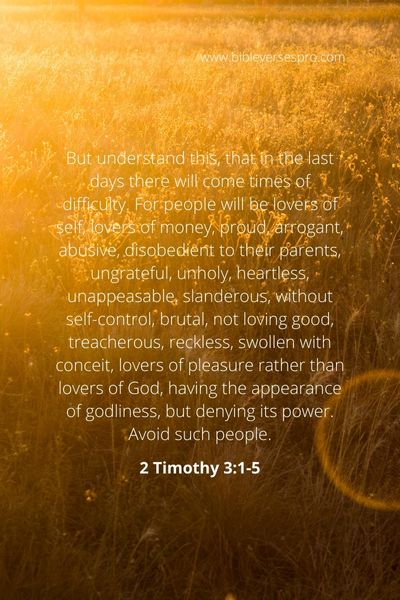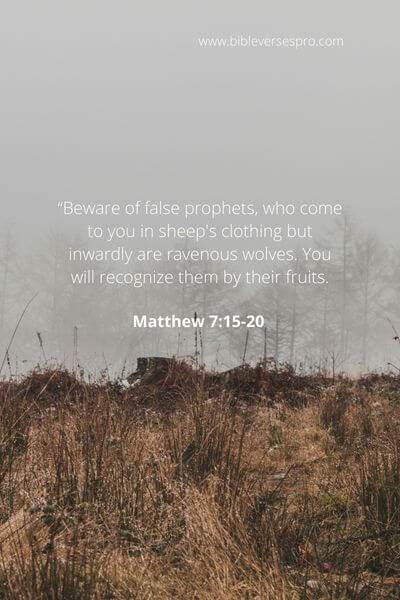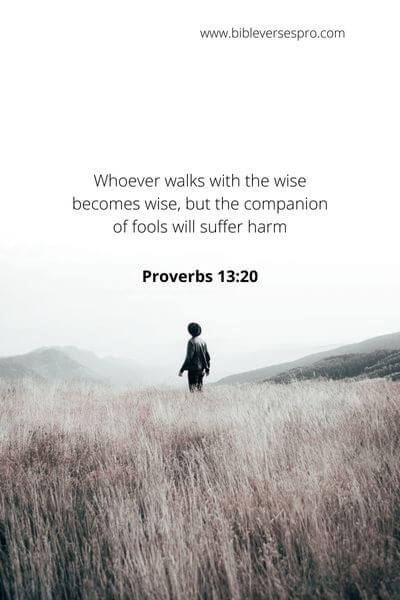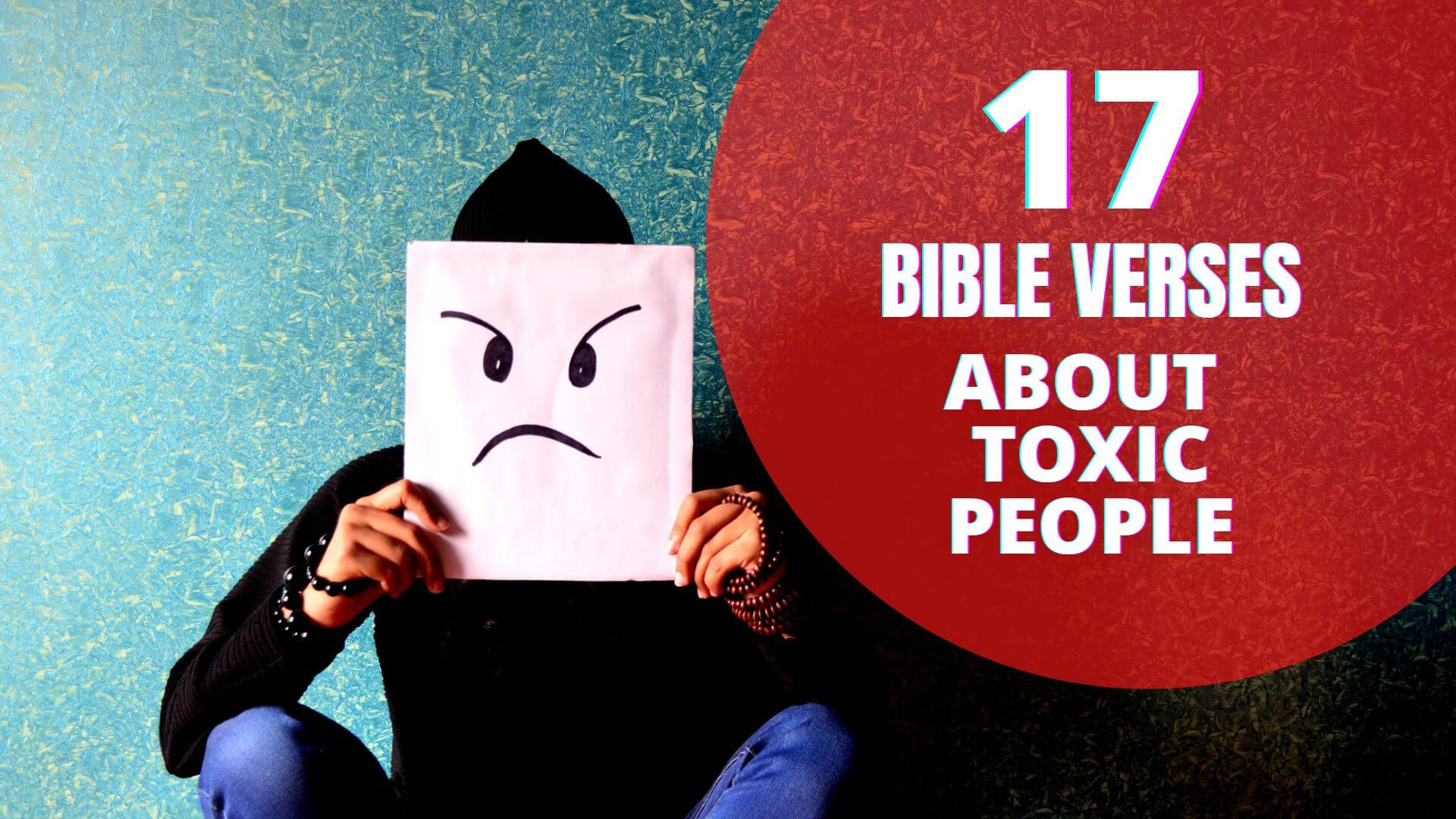Toxic people are an epidemic in today’s society. They are hard to spot and can sneak up on you without notice. However, there are 23 Bible verses about toxic people that you need to know.
Bible Verses about Toxic People
Toxic people are everywhere, today’s society is full of them. Their intentions may be good, but it feels like they’re always out to hurt you. The Bible teaches us to love, but toxic people can make it difficult for you to do so.
Luke 6:28 – All who put their faith in Christ should demonstrate unfailing love.
Bless those who curse you, pray for those who abuse you.
Luke 6:28 (ESV)

It is hard for us to love our enemies and to be kind to those who despise us on our own. It takes a special kind of love for us to love toxic people.
Godly love can only be demonstrated in individuals with the Holy Spirit residing within them and can only be done when one’s life is totally devoted to the Lord in word and deed.
All who put their faith in Christ should demonstrate the unfailing love of God since we are one with Him.
But it won’t become apparent until we die to ourselves and live for Christ until we abide in Him and He in us.
Psalm 51:10 – You can not love your enemy by your own strength.
Create in me a clean heart, O God, and renew a right spirit within me.
Psalm 51:10 (ESV)

We can only be reborn as a new creation in Jesus, with a clean heart, by trusting in the death, burial, and resurrection of the Lord Jesus.
We are only able to receive God’s declaration of righteousness and have Christ’s righteousness credited to us via trust in the Lord Jesus Christ and our identity with HIM.
David recognized the stained state of his fallen spirit and he knew that he can not love his enemies by his own strength, that is why he cried out to God to cleanse his heart of sin.
He prayed, “O God, create in me a pure heart and refresh a steady spirit inside me.” “Do not cast me out of your presence, and do not take away the Holy Spirit from me.”
Ephesians 4:31-32 – We are advised to let go of all bitterness.
Let all bitterness and wrath and anger and clamor and slander be put away from you, along with all malice. Be kind to one another, tenderhearted, forgiving one another, as God in Christ forgave you.
Ephesians 4:31-32 (ESV)

Bitterness is one of the most widespread sins that all too frequently fuels our carnal attitudes and appetites.
Bitterness is frequently the cause of many emotional outbursts and is all too frequently brought on by stifling resentment toward another person’s injustice or unfairness.
That is why we are advised in this verse to let go of all bitterness in our hearts, forgiving one another as God forgave us our sins.
Proverbs 22:24-25 – One runs a greater risk the closer they are to someone who is prone to wrath.
Make no friendship with a man given to anger, nor go with a wrathful man, lest you learn his ways and entangle yourself in a snare.
Proverbs 22:24-25 (ESV)

We have been warned in this Bible verse against developing a close relationship with someone who has a volatile temper.
One runs a greater risk the closer they are to someone who is prone to wrath or who is a toxic person.
The two portions of this passage seem to suggest that it is best to steer clear of friendships and even business relationships with such people.
2 Timothy 3:1-5 – Avoid them so they won’t corrupt you.
But understand this, that in the last days there will come times of difficulty. For people will be lovers of self, lovers of money, proud, arrogant, abusive, disobedient to their parents, ungrateful, unholy, heartless, unappeasable, slanderous, without self-control, brutal, not loving good, treacherous, reckless, swollen with conceit, lovers of pleasure rather than lovers of God, having the appearance of godliness, but denying its power. Avoid such people.
2 Timothy 3:1-5 (ESV)

Paul makes Timothy understand that in the last days, many people will be lovers of themselves, they will be toxic people, and also an ungrateful set of people.
How then are we expected to behave with this set of people? We are advised to avoid them so they won’t corrupt us. Christians are also expected to pray for this set of people.
Matthew 7:15-20 – Beware of cunning people.
“Beware of false prophets, who come to you in sheep’s clothing but inwardly are ravenous wolves. You will recognize them by their fruits. Are grapes gathered from thornbushes, or figs from thistles? So, every healthy tree bears good fruit, but the diseased tree bears bad fruit. A healthy tree cannot bear bad fruit, nor can a diseased tree bear good fruit. Every tree that does not bear good fruit is cut down and thrown into the fire. …
Matthew 7:15-20 (ESV)

Jesus warns His disciples to be wary of false prophets in this passage. In general, it also relates to persons who exaggerate their religious beliefs. These people could pretend to be lovers of God, but they are not.
In actuality, they are just as cunning and harmful as wolves dressed as sheep. And we have been warned to stay clear of these false prophets.
Matthew 7:6 – The lesson is to not waste valuable resources on individuals who won’t value them.
“Do not give dogs what is holy, and do not throw your pearls before pigs, lest they trample them underfoot and turn to attack you.
Matthew 7:6 (ESV)

It’s simple to get caught up in the imagery presentation of dogs and pigs and overlook the actual idea, which is not meant to be offensive.
The lesson is to not waste valuable resources on individuals who won’t value them and may even be offended by the offer. The best thing is to avoid them completely we have been advised.
1 Corinthians 13:1-13 – It’s all God’s purpose.
If I speak in the tongues of men and of angels, but have not love, I am a noisy gong or a clanging cymbal. And if I have prophetic powers, and understand all mysteries and all knowledge, and if I have all faith, so as to remove mountains, but have not love, I am nothing. If I give away all I have, and if I deliver up my body to be burned, but have not love, I gain nothing. Love is patient and kind; love does not envy or boast; it is not arrogant or rude. It does not insist on its own way; it is not irritable or resentful;
1 Corinthians 13:1-13 (ESV)

This scripture clarifies misconceptions among the Corinthian Christians regarding spiritual talents.
Evidently, some people thought that those who could prophesy or speak in tongues were more spiritual than others.
Along with feelings of inferiority or jealousy, this might have led to the creation of yet another cause for conflict inside the church.
Every spiritual gift, according to Paul, was bestowed by God for a specific purpose and was necessary for the church, the body of Christ.
Proverbs 4:14-17 – Stay away from the wicked’s way.
Do not enter the path of the wicked, and do not walk in the way of the evil. Avoid it; do not go on it; turn away from it and pass on. For they cannot sleep unless they have done wrong; they are robbed of sleep unless they have made someone stumble. For they eat the bread of wickedness and drink the wine of violence.
Proverbs 4:14-17 (ESV)

Those who are young would do well to heed this counsel in particular. Solomon cautions against following the wicked and toxic friend or going their way.
He previously offered similar advice in Proverbs by saying, “My son, if sinners entice you, do not succumb.”
According to what Jesus taught, there are two possible paths through life, and each individual must decide which one he will take. He reiterated Solomon’s counsel to stay away from the wicked’s way.
Even believers can be swayed by peer pressure to follow the evil road, but in order to avoid committing wrong and suffering its effects, believers must practice faith and obedience.
Bible verses about toxic friendships
Toxic friendships are friendships that have harmful effects on the person being befriended. They can make you feel worthless, unworthy and more susceptible to depression. In this guide you will find biblical verses about toxic friendships so that you can recognize a toxic friendship and get free of it.
Proverbs 13:20
Whoever walks with the wise becomes wise, but the companion of fools will suffer harm
Proverbs 13:20 (ESV)

It is crucial to make intelligent selections of our friends. Our decisions and view on life are influenced by the people we choose to surround ourselves with.
Their decisions could impact our lives. Many depressing tales center on those who were caught in or caught in the middle of violent or criminal acts performed by their ‘friends.
When analyzing how the book of Proverbs defines concepts like “wisdom” and “foolishness,” caution with friendship is especially important. An intelligent individual looks for God and the truth.
2 Corinthians 6:14
Do not be unequally yoked with unbelievers. For what partnership has righteousness with lawlessness? Or what fellowship has light with darkness?
2 Corinthians 6:14 (ESV)
The basic rule is that it is best to end a toxic relationship before it even starts if it will prevent or hinders a developing connection with the Lord.
The general rule Paul was teaching is that Christians should never initiate, maintain, or desire close, intimate association with unbelievers because doing so invariably prevents or inhibits close communing with the Lord.
Paul was not advocating that the Christian be completely isolated from unbelievers, nor was he condemning casual interactions, but that Christians should be careful with sinners.
Proverbs 15:1
A soft answer turns away wrath, but a harsh word stirs up anger.
Proverbs 15:1 (ESV)
Solomon offers sound guidance on how to handle anger and toxic friends. A soft or gentle response, according to him, might diffuse a potentially angry person.
Here, wrath is more accurately translated as fury. The most natural reaction to being offended or upset is to get outraged and match the other person’s wrath with our own rage.
A person will only exacerbate the situation if they chose to react to their wrath with harsh, cruel words. Cutting, sarcastic comments just fuel the angry person’s rage, which breeds more antagonism.
James 1:8
He is a double-minded man, unstable in all his ways.
James 1:8 (ESV)
When dealing with friends or people that are double-minded in their character, we must be careful.
We must apply wisdom with toxic friends with a double mindset as they might easily change within a twinkle of an eye.
James 1:19
Know this, my beloved brothers: let every person be quick to hear, slow to speak, slow to anger;
James 1:19 (ESV)
There are numerous passages in the Bible that forewarn about the poison that can come from the tongue and the harm that careless words or ferocious tempers can do, which can frequently start a fire that harms a significant number of people.
In order to calm a situation and prevent a flare-up, other Scriptures encourage us to listen to what is said, to hear what is uttered, to protect our lips in what we say, and our reactions in whatever we do.
James was admonishing believers against self-deception in this text. He was urging them in particular to carefully consider the words they spoke. We should not be toxic with our words.
Amos 3:3
“Do two walk together, unless they have agreed to meet?
Amos 3:3 (ESV)
Can two walk together unless they are agreed? This is a subject that Christians in this era should also think about. Should a toxic person go with a nontoxic friend?
God’s chosen people had drifted far from their God, and He provided numerous illustrations via the prophet Amos.
Therefore, it is crucial that we go within to determine whether we are acting in accordance with faith, moving in the spirit, embracing His truth, praising God in all circumstances, praying without ceasing, and relying on His dependability in everything.
Ephesians 4:26
Be angry and do not sin; do not let the sun go down on your anger,
Ephesians 4:26 (ESV)
While admonishing us against worldliness, instability, and toxic friends, Paul encourages us to spirituality, unity, and maturity in dealing with people like these.
He exhorts us to put off our old, sinful selves and put on new, Christlike selves by daily being renewed in the spirit of our mind.
He calls us to give up our fleshly lusts, worldly ways, unclean thoughts, and greedy attitudes.
Philippians 2:3-4
Do nothing from rivalry or conceit, but in humility count others more significant than yourselves. Let each of you look not only to his own interests, but also to the interests of others.
Philippians 2:3-4 (ESV)
Paul exhorts his readers to abstain from being avaricious or dishonest with people. His intention was to shift attention from himself to others.
Paul starts by discussing pride and erroneous ambition motivations. Love and unity are not our genuine ideals when these influence our decisions with our friends.
We should be nice to people and not always after our personal gains.
Related Questions on Toxic People
What the Bible says about toxic family members?
John 15:19 says, “If you were of the world, the world would love you as its own; but because you are not of the world, but I chose you out of the world, therefore the world hates you.”
We tend to think that toxic family members are those who always fight with each other or have an intense dislike for one another.
In reality, toxic family members are those who are constantly fighting with each other about everything from which TV show to watch on Saturday night to whether or not they should get a dog.
Toxic family members may be loving and supportive at first but turn on each other in an instant if they feel threatened by any changes in their lives or circumstances.
How do you deal with toxic people biblically?
The Bible teaches that we are to love our neighbors as ourselves. If a person is hurting us, we are to speak up for ourselves. If someone is hurting us, then we should not keep silent about it and let them get away with it.
- Forgive them and pray for them.
- If someone has been abusive towards you, then the best thing you can do is tell someone else about it.
- Tell your pastor or another trusted adult right away.
- If no one else will help you out of this situation, then maybe God will help through his Word and Holy Spirit who live within each of us (Romans 8:26).
- Let go of the relationship
What does the Bible say about letting go of toxic relationships?
The Bible is full of warnings to avoid the company of toxic people. This is one of the most important things we can do as Christians.
The Bible says that we should avoid anyone who is angry, spiteful, or jealous (Proverbs 6:19-20), and it actually gives us a list of “enemies” that we should avoid being around (Ephesians 4:15). The same is true for any kind of relationship that brings negative feelings into our lives.
We also need to be careful about how much time we spend with toxic people. If someone has been causing problems in your life for a long time, then it might be worth considering whether they are worth keeping around at all.
Who was a toxic person in the Bible?
There are some people in the Bible who are toxic to others, but also some who are toxic to themselves.
Some of the most toxic people in the Bible include Cain and Abel, Esau, Jacob/Israel, Joseph’s brothers, King Saul, King David, King Solomon and King Herod.
In a few cases, the Bible uses the word toxic as an adjective. For example, there are times when God’s people were described as “toxic” or “poisonous.”
This can be seen in the book of Nehemiah when he was trying to rebuild Jerusalem after it had been destroyed by foreign enemies (Nehemiah 2:1-9). He says that people who were there with him were “not like ourselves, nor like our fathers; for they dealt proudly and acted corruptly” (Nehemiah 2:6).
It seems that even though they had been brought up in Israel’s religion, they had become proud and self-centered individuals who did not care about others.
There are other examples where a person is described as being toxic in the Bible. For example, King Ahab was so obsessed with killing Naboth that he would do anything to get Naboth out of his way (1 Kings 21:1-19).








2 comments
Wondering how you can love your enemies if you cut the toxic people off?
There is a big difference between cutting off toxic people and loving your enemies.
You can cut off toxic people and still love them